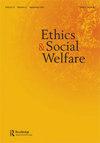社会工作伦理中的白人至上
IF 0.9
Q4 SOCIAL WORK
引用次数: 0
摘要
摘要本文专门探讨了种族主义作为社会工作领域的一个伦理问题,并质疑为什么在伦理学的话语框架中没有充分强调它。利用两项针对强调种族主义经历的种族主义从业者的研究,说明了将种族主义作为一个道德问题最小化。主导群体的无知认识论有助于维持主导地位的规范。这些认识论上的失误,如社会工作中所体现的,都被描绘出来了。此外,还考虑了基于康德工作的伦理准则的使用,康德也是种族等级制度的建筑师。对这种历史联系的探索,以及随后在社会工作中使用的传统伦理方法,揭示了普遍原则的困难,因为它们在全球北方被解释为社会工作伦理的主要指导。这些问题的结果导致了对那些受种族主义影响的人的证明和解释学的不公正,造成了重大伤害。本文章由计算机程序翻译,如有差异,请以英文原文为准。
The Supremacy of Whiteness in Social Work Ethics
ABSTRACT This paper explores racism specifically as an ethical concern in the field of social work and queries why it has been insufficiently emphasised in the discursive frames on ethics. The minimisation of racism as an ethical issue is illustrated utilising two research studies with racialised practitioners who highlighted experiences of racism. Epistemologies of ignorance by dominant groups contribute to norms that maintain dominance. These epistemological failings, as exemplified in social work, are delineated. Additionally, the utilisation of codes of ethics, based on the work of Kant, who was also an architect of a hierarchy of races, is considered. An exploration of this historical connection, and the traditional approach to ethics used in social work that followed, illuminates a difficulty with universal principles as they are interpreted in the Global North for primary guidance in social work ethics. The outcome of these problems results in testimonial and hermeneutic injustice for those affected by racism, causing significant harm.
求助全文
通过发布文献求助,成功后即可免费获取论文全文。
去求助
来源期刊

Ethics and Social Welfare
SOCIAL WORK-
CiteScore
1.60
自引率
20.00%
发文量
36
期刊介绍:
Ethics and Social Welfare publishes articles of a critical and reflective nature concerned with the ethical issues surrounding social welfare practice and policy. It has a particular focus on social work (including practice with individuals, families and small groups), social care, youth and community work and related professions. The aim of the journal is to encourage dialogue and debate across social, intercultural and international boundaries on the serious ethical issues relating to professional interventions into social life. Through this we hope to contribute towards deepening understandings and further ethical practice in the field of social welfare. The journal welcomes material in a variety of formats, including high quality peer-reviewed academic papers, reflections, debates and commentaries on policy and practice, book reviews and review articles. We actively encourage a diverse range of contributions from academic and field practitioners, voluntary workers, service users, carers and people bringing the perspectives of oppressed groups. Contributions might include reports on research studies on the influence of values and ethics in social welfare practice, education and organisational structures, theoretical papers discussing the evolution of social welfare values and ethics, linked to contemporary philosophical, social and ethical thought, accounts of ethical issues, problems and dilemmas in practice, and reflections on the ethics and values of policy and organisational development. The journal aims for the highest standards in its published material. All material submitted to the journal is subject to a process of assessment and evaluation through the Editors and through peer review.
 求助内容:
求助内容: 应助结果提醒方式:
应助结果提醒方式:


